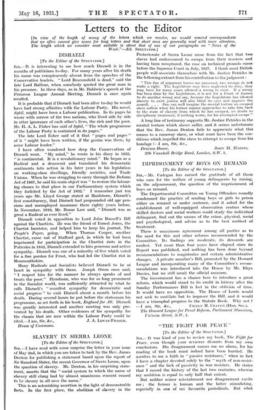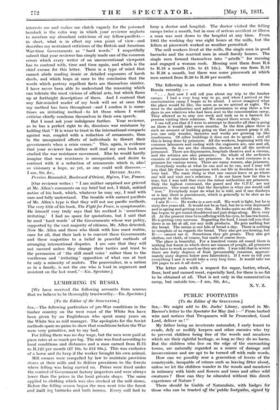" THE FIGHT FOR PEACE "
[To the Editor of the SPECTATOR.] SIR,—It was kind of you to review my book, The Fight for Peace, even though your reviewer dissents from my own conclusions. His disagreement causes me no alarm, for his reading of the book must indeed have been hurried. He ascribes to me a faith in " passive resistance," when in fact I have a chapter devoted solely to the " myth of non-resist- ance " and the lack of passivity in war resisters. He states that I record the history of the last two centuries, whereas my ambition is equal to only half that extent.
But neither minor misstatement nor disagreement excite me ; the former is human and the latter stimulating, especially in one of my favourite periodicals. But what
interests me and makes me clutch vaguely for the poisoned hemlock is the calm way in which your reviewer neglects to mention my abundant criticisms of my fellow-pacifists- in short, what is in effect my own point of view—and describes my restrained criticisms of the British and American War-time Governments as " hard words." I respectfully submit that your reviewer has simply made one of the common errors which every writer of an unconventional viewpoint has to contend with, time and time again, and which is the chief excuse for this letter. There is a type of mind that cannot abide reading ironic or detailed exposures of harsh deeds, and which leaps at once to the conclusion that the words which portray repellent facts are themselves sinister. I have never been able to understand the reasoning which can tolerate the most vicious pf official acts, but which flares up at forthright descriptions of them. And I contend that any fair-minded reader of my book will see at once that my method has been throughout—and I confess it is some- times an irritating method—to let those whom I would criticize chiefly condemn themselves in their own speech.
But I must ask your indulgence further. Your reviewer, as he has a perfect right to do, dismisses war resistance by holding that " It is wiser to trust in the international compacts against war, coupled with a reduction of armaments, than in the unorganized efforts of individuals to thwart their governments when a crisis comes." This, again, is evidence that your reviewer has neither well read my own book nor studied the war resistance movement. Else he would hardly imagine that war resistance is unorganized, and desire to contrast with it a reduction of armaments which is, alas ! as visionary a hope, as yet, as one could well discover.— I am, Sir, &c., DEVERE ALLEN. Pension Beausoleil, Boulevard d'Orient, Hyeres, V ar, France.
[Our reviewer writes : " I am neither surprised nor grieved at Mr. Allen's comments on my brief but not, I think, unkind notice of his book, which, whatever he may say, I read with care and fully understand. The trouble with earnest pacifists of Mr. Allen's type is that they will not use pacific methods. The very title of his book, The Fight for Peace, is symptomatic. He himself very truly says that his method is ' sometimes irritating.' I had no space for quotations, but I said that he used ' hard words ' of the Governments whose war policy, supported by the vast majority of citizens, Mr. Allen detested. Now Mr. Allen and those who think with him must realize, once for all, that their task is to convert these Governments and these majorities to a belief in peaceful methods of arranging international disputes. I am sure that they will not succeed unless they change their tactics and trust to the persuasion of ' the still small voice ' rather than to the vociferous and ' irritating' opposition of what can at best be only a minority of zealots. The peacemaker, in a nation as in a family, is not the one who is loud in argument and insistent on the last word."—En. Spectator.]



















































 Previous page
Previous page